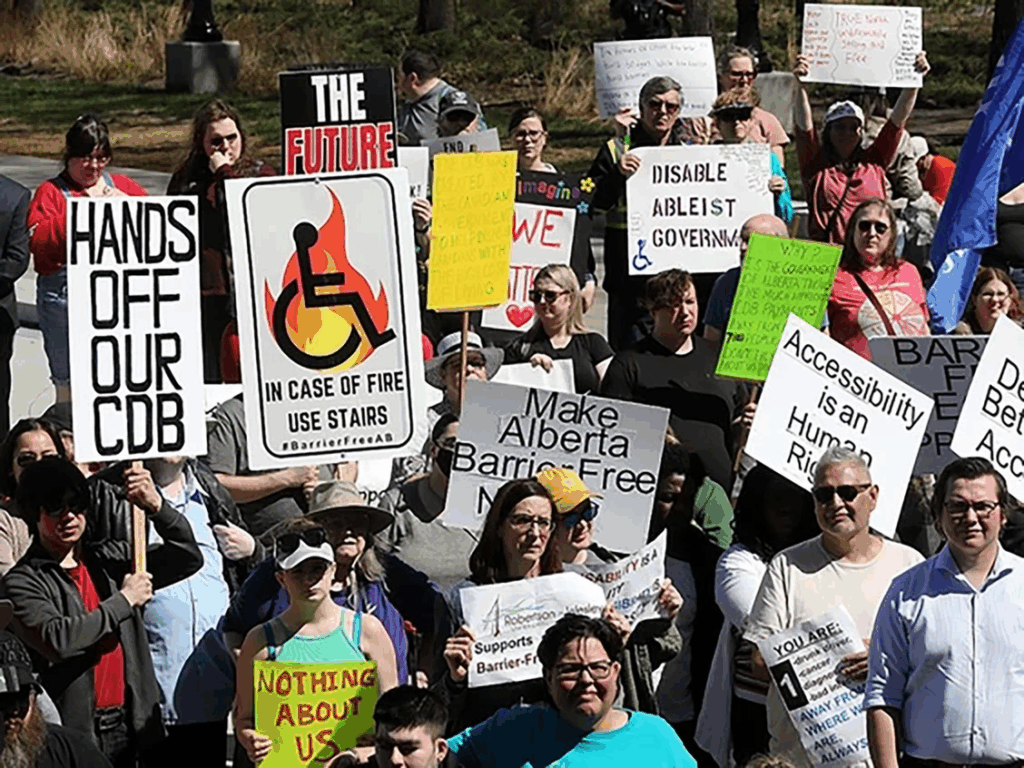Opinion: In Alberta’s grab for federal cash, Albertans with disabilities pay the price

Disability advocates, allies, and organizations gather in Edmonton outside the Alberta legislature for the Act NOW Rally on May 6, 2025, calling for urgent action on accessibility legislation, income support reform, and meaningful consultation with the disability community. David Bloom, Postmedia
By Emily Phillipos, Adam Cembrowski, Thomas Feth, Chris Wiebe, Andrew Green and Anna Lund, Calgary Herald, June 20, 2025
Starting in July, Canadians with disabilities are due to start receiving an extra $200 per month — except in Alberta, where that additional income will instead flow to the provincial government.
The federal Canada Disability Benefit is designed to address poverty and enhance financial security for working-age individuals with disabilities. Its primary goal is to reduce pervasive disability poverty and improve recipients’ quality of life by providing them with consistent, additional income. Only $200 a month is completely inadequate to achieve this goal, but people with disabilities in Alberta will not even experience that meagre increase in their finances.
The Alberta government plans to claw back the benefit from any recipients receiving income support. People with disabilities face barriers to employment and consequently are more reliant on government income programs than people without disabilities. In Alberta, these programs include Assured Income for the Severely Handicapped (AISH).
Any amount an individual receives under the Canada Disability Benefit will be deducted, dollar for dollar, from the amounts they are eligible to receive under AISH. In other words, Albertans who receive AISH will not benefit from the federal program. The Alberta government has cut $49 million in funding for the AISH program in anticipation of the amounts it will reap from clawing back the Canada Disability Benefit.
Alberta is the only province clawing back the benefit. It has justified its stance with the argument that AISH’s benefits are higher than comparable income support programs in other provinces. But keep in mind that the maximum living allowance for a single person under AISH is $1,901 a month ($22,812 per year). In 2024, Statistics Canada estimated that the cost of a “modest, basic standard of living” in Alberta would be between $27,886 and $29,736, depending on where in the province a person lived. AISH is insufficient to cover these costs, even with the extra $2,400 a year that the Canada Disability Benefit would provide if not clawed back.
Alberta’s decision to claw back the Canada Disability Benefit from AISH recipients is troubling enough on its own. But, Alberta will also have power under the AISH regulations to reduce or terminate the benefits of any AISH recipient who fails to apply for the new benefit. To receive the Canada Disability Benefit, an individual must qualify for a federal Disability Tax Credit. So, AISH recipients will be forced to apply for both the tax credit and the benefit, despite the knowledge that they will not benefit from either, and under threat of having their AISH benefits reduced or terminated.
Many people struggle to complete the Disability Tax Credit application. Finding a health-care provider willing to complete the necessary forms can be challenging, especially for the more than 650,000 Albertans in need of a family doctor. Cost is also a barrier, as health-care providers may charge fees as high as $300 to complete the forms.
An industry of promoters has emerged to help with tax credit applications, but they often charge exorbitant fees. The federal government attempted to restrict the fees promoters could charge, but the relevant law is currently suspended while we wait for a court decision on whether it is constitutional. The Alberta government is pushing AISH recipients into the hands of promoters charging unrestricted fees.
People with disabilities across the country had hoped the Canada Disability Benefit would help them move further from poverty. It was supposed to be a little extra that could have kept many from relying on food banks. As it stands in Alberta, the Canada Disability Benefit has become a subsidy for the provincial government’s finances that will have no positive effect on the lives of people with disabilities.
The provincial government can and should do better.
Emily Phillipos, Adam Cembrowski, Thomas Feth, Chris Wiebe, Andrew Green and Anna Lund are members of Justice and Equity Alberta, a non-profit that seeks to protect and advance the human rights of marginalized people in Alberta through the legal system.
 Source Calgary Herald
Source Calgary Herald
Also see
About the Canada Disability Benefit program Government of Canada
